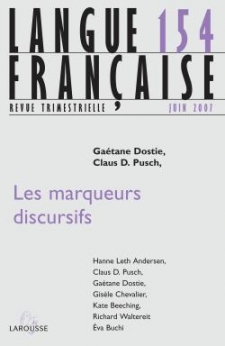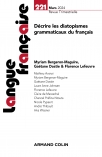
Langue française n° 154 (2/2007)
Pour acheter ce numéro, contactez-nous
Recevez les numéros de l'année en cours et accédez à l'intégralité des articles en ligne.
This article deals with a group of discourse markers that resemble sentences containing a finite verb, from a formal point of view, but that function as discourse markers which are invariable in form and which cannot govern other sentence elements. A distinction can be made between two different groups of such sentential DMs, characterized respectively by the first person singular je pense, je crois, je trouve and the second person singular or plural (tu sais/vous savez, tu vois/vous voyez). Imperative constructions can be added to form a further group of such items. The aim is to show that these expressions have undergone a grammaticalization from free verbs to discourse markers, that they have lost their ability to be governing verbs (“verbes recteurs”), and that this can be seen in the following traits : morphological invariability, optionality, free position, no propositional contribution to the utterance, and subjective meaning. Their function becomes that of a phrasal adverb. Semantically, the functions of the governing verb and the discourse marker are not totally different, but the basic meaning of the governing verb is modified or weakened in the discourse marker function. Sentential discourse markers have a phatic function in oral interactions and provide structure at a syntactic and thematic as well as at a discourse level. The first group is not fully grammaticalized as a discourse marker in conventional (written) French, since it is unacceptable in the first position where the use of the complementizer que is obligatory, even though the structure without que can be found in Middle French. In the written mode it is thus not possible to distinguish between a governing verb and a parenthetical use of the verb. A third group might be added since it is possible to discuss the dependency relation between quotation verbs, traditionally analysed as governing verbs, and quotes.

